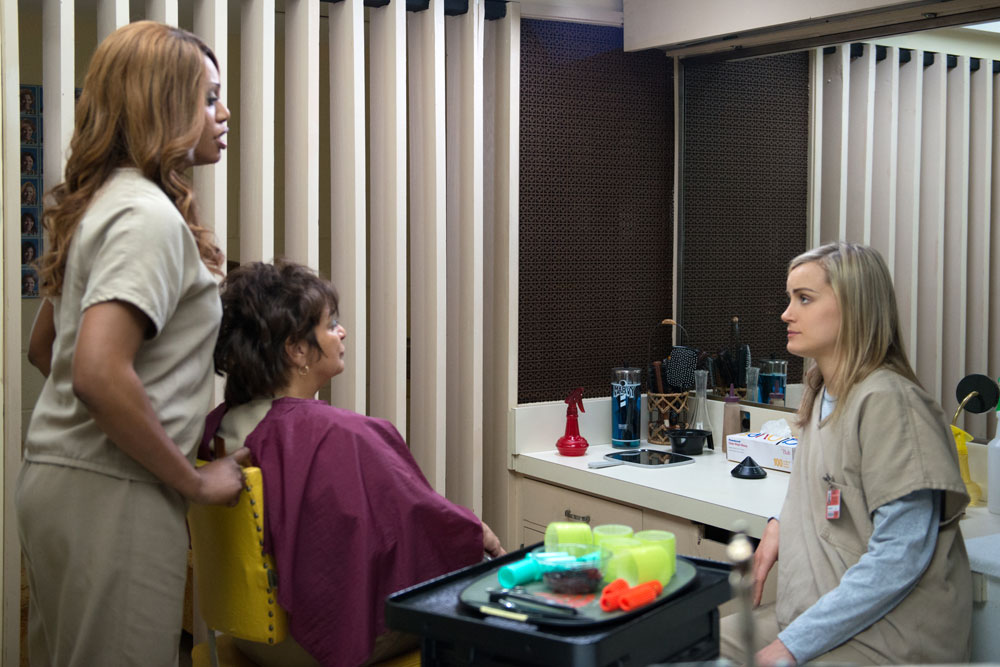 Laverne Cox, Lin Tucci and Taylor Schilling in Netflix’s “Orange is the New Black”
Laverne Cox, Lin Tucci and Taylor Schilling in Netflix’s “Orange is the New Black”
“No one gives a shit about old ladies. We remind everyone that they’re going to die.”
The twin core themes of privilege and power took center stage with this episode, and we found ourselves surprised to be a little relieved that Vee was sidelined, for the most part. She’s absolutely the most compelling character in the story right now, aided in no small part by Lorraine Toussaint’s buzz-worthy performance, but she’s in danger of overwhelming all the other characters. And besides, it gets depressing watching her set all those friends against each other week in and week out. “I don’t trust any of you crazy bitches,” Gloria says smartly, effectively shutting this storyline down until the next episode.
Instead we get a much-welcome focus on Rosa, who has no power and no privilege at all in her current situation, the result of which is her impending death. Healy informs her that her cancer has advanced and that the state won’t be paying for her oophorectomy. Then he reprimands her for saying “fuck.” You’re not even allowed to have a normal emotional reaction in prison, even as you’re delivered the news that you will be dying. He impotently tells her that she has to remain positive but she calls him useless, a response that had us clutching our imaginary pearls because he tends to not react well to women cutting him down. But he’s been getting some well-executed character rehab this season. He’s not what we’d truly be able to call a sympathetic character, just because his paranoid ideas about women are so screwed up, but he’s at least someone who’s trying to do good at the moment. This could change at any time, since he’s so petulant, but it’s encouraging that he stood up to being called useless by Rosa and dealt calmly (for the most part) with Piper’s ungratefulness and didn’t wind up punishing someone else because a woman was mean to him. That’s about as much growth as you can expect out of anyone in a place like Litchfield.
Anyway, back to Rosa. Literally. She gets her flashback, which led to claps of glee from us over her perfectly rendered circa 1980 wardrobe. Between Rosa and the Golden Girls, we’re loving the focus on characters that could have been left as nothing but background. It’s to the show creators’ credit that they saw the value in opening this world up a little bit. And it’s no surprise that they’re mining the older women for stories just as well as they did every other group so far. Like Lorna and Cindy, Rosa’s past reveals a true criminality, rather than a victim who made bad choices. On the contrary, Rosa loved being a criminal and got turned on by it. There doesn’t seem to be the slightest hint of regret, except that she was so unprofessional as to wind up in prison. She still misses the thrill of armed robbery and the smell of cash. “I always pictured going out in a blaze of glory,” she says sadly. But she manages to get one last thrill as she and her little chemo buddy mount a heist in the middle of their treatments. It’s a sweet way to not only give this character depth, but to show that an older person and a very young one can sometimes make connections in the unlikeliest of manners and settings. “Enjoy your life, shitpot.” It’s the most heartfelt advice she could’ve given, knowing how much she misses the part of her life she enjoyed the most.
On the privilege side of the aisle, we get Piper, the pretty blonde white girl who once again gets something no one else can ever recall getting in the history of Litchfield: a furlough, to visit her dying grandmother. Healy wound up pushing for it partially because Rosa called him “useless” and partially because he feels he owes Piper for almost getting her killed last season. But let’s face it: the number one motivating factor for Healy was the fact that she’s a pretty white girl, even though he’d never admit it. And while Piper can admit it to her very angry and jealous co-inmates, she does so in such a defiant and begrudging way that we may have cheered a little when Suzanne threw her dessert at her. And we all know how much importance Suzanne places on the act of dessert-throwing.
Brook Soso is turning out to be less of a parody of Piper and more as some sort of a rebuke to her. Annoying she may be, but we’re starting to admire her for having real principles and doing her best not to compromise them. She’s doomed to failure on this front – especially veganism in prison – but it’s impressive how long her attempts at reform, protest, and community-building are still going strong. “I am demonstrating passive resistance,” she cries when forced to take a shower, not realizing yet she’s no longer a person to these people. It’s a little sad, a little funny, and a little admirable all at the same time. She’s sincere all the way through. Compare that to Piper, who takes up a seconds-long interest in knitting with the Golden Girls, just because she wants to talk about her dying grandmother. Brook, for all her annoyances, is more real than Piper is by a mile.
Of course that doesn’t mean we didn’t laugh out loud at Pennsatucky’s “YOU SMELL LIKE A FUCKING TURTLE TANK.” A true hillbilly poet, that one. Joking aside, ‘Tucky’s finding out that which Red and Vee already know: you have no power in prison if you don’t have people willing to give it to you. None of the other former members of her posse respect her anymore, leaving her to rant somewhat impotently. We’re surprised by how much we feel sorry for her.
In the continuing saga of abuse constantly begetting more abuse in this world, Figueroa gets gum on her Louboutins, notices all the contraband floating around, and tears into Caputo, who goes on a week-long rampage of shot quotas, accusations, pot-throwing (literally) and ultimately, firing Fischer for having the bad taste to date Luzchek. We’re supposed to feel sorry for him, or like he’s being pulled in all directions, but he’s starting to become as bad as the ever-worsening Figueroa, in terms of weirdly broad characterization that almost doesn’t fit in the show. We can’t roll our eyes hard enough at the idea of an assistant warden walking through a prison in a pair of 700-dollar shoes and then complaining she got gum on them. We’re not asking for hard realism here, but that’s just straight-up cartoon character silliness. As for Caputo, they just keeping hammering home the same points of sexual frustration and pressure from above causing him to make all these dick moves, but it’s just not working all that well. They already have the frustrated, emasculated, power-abusing male character in Healy. And they don’t let that guy make any decision – down to what color dress to buy his wife – without agonizing over it, explaining the reasons for it, and exploring the consequences of it. Why are they trying to repeat these concepts in another character when they’ve already beaten them to death in the first one? There’s got to be more to Caputo and Healy than just being sexually frustrated middle-aged white guys who hate their bosses; especially if you’re going to have their actions and decisions resonate so much. Or maybe there’s nothing more interesting to say about them than that, but we wouldn’t want to hang a whole season on exploring such themes in a show like this. Give us more stories about women of every shape and color. Leave the white-guy angst for … practically every other television show ever.
[Photo Credit: Ali Goldstein for Netflix]
Keira Knightley Style Double Shot Next Post:
Benedict Cumberbatch on the Set of “Black Mass”
Please review our Community Guidelines before posting a comment. Thank you!



